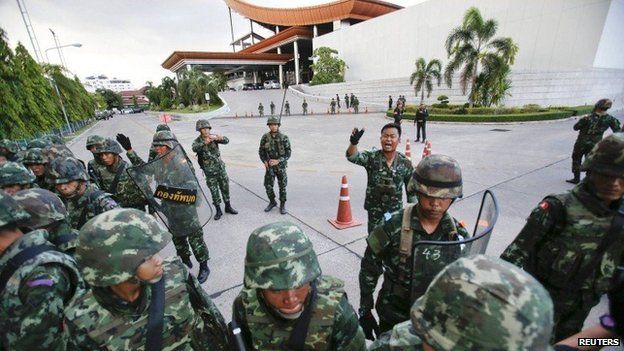Thai Coup Attempt Mostly Just Words Continued From Page 1
Why is Thailand under military rule?
 Image source, Reuters
Image source, Reuters
Soldiers moved rapidly to take control in Bangkok
Thailand's army has seized power in a coup after months of political turmoil. BBC News looks at why this has happened.
What prompted the coup?
The military says it has taken control of the government and suspended the constitution in order to restore order and enact political reforms.
Thailand is currently in a political mess. The country has been in the grip of unrest for months, with the opposition saying the democratically elected government must go because it is corrupt. A number of people have been killed in the violence.
Observers say it is very hard to see how the problems can be resolved any time soon.
What is happening on the ground?
The coup comes after months of escalating tensions
The cabinet has been ordered to report to the military and gatherings of more than five people have been banned.
A nationwide curfew is in force between 22:00 and 05:00 local time. The broadcast media have been told to suspend all normal programming.
A military statement said army chief Gen Prayuth would head a ruling military body - the National Peace and Order Maintaining Council - but that the upper house of parliament and courts would continue to function.
Political party leaders, including opposition leader Suthep Thaugsuban, were taken away from a venue where they had been holding talks with the army after troops sealed off the area.
Shortly after the coup announcement soldiers moved rapidly on the "red shirt" camp on the outskirts of Bangkok, as well as towards the anti-government demonstrators' camp in the centre of town. Troops fired into the air to disperse the pro-government protest camp but there are no reports of major violence.
Have there been coups before?
Image source, AP
Soldiers have a history of taking control in Thailand
Many observers were sceptical when the army insisted its declaration of martial law on 20 May did not amount to a takeover. Two days later they were proved right.
There have been numerous military coups in recent decades - this is the 12th since the end of absolute monarchy in 1932.
The last coup before this one was in 2006, when then Prime Minister Thaksin Shinawatra was toppled by the army after being accused of corruption.
The army is often accused of being sympathetic to the cause of his opponents in the current anti-government movement.
What could happen now?
Image source, AFP
Some anti-government protesters celebrated the coup, but their camp in Bangkok is being disbanded
Many Thailand watchers fear the army move could enrage government supporters.
The BBC's Jonah Fisher in Bangkok says those people who voted for what is still the elected government will feel extremely frustrated by what has happened.
Most people are expecting the "red shirts", the broad protest movement linked to the government, to rally and are extremely concerned about the possibility of confrontation, he adds.
There are also worries about the economy - Thailand's currency the baht sank after the coup announcement. The stock exchange says it expects to keep operating as normal.
The government has been trying to organise a date for a new general election - those moves have been thrown into great uncertainty.
What are the roots of the crisis?
Image source, AP
Thai society is polarised, with two distinct political sides
There is a deep political divide in Thailand - between mostly rural, often poor, supporters of Mr Thaksin, and an urban middle class who object to what they see as his continuing influence in Thai politics.
There have been regular protests by both sides ever since Mr Thaksin was ousted in 2006, but in the past few years the focus has been on the current Thaksin-aligned Pheu Thai government.
The protests began to escalate into violence last November, after the lower house passed a controversial amnesty bill which critics said could allow Mr Thaksin to return from exile without serving time in jail.
The anti-government camp claims that at least 28 people have died since then.
The situation deteriorated still further earlier this month, when a controversial court ruling removed Mr Thaksin's sister Yingluck from her position as prime minister, saying she had acted illegally by moving her national security chief to another position.
Who are the two sides?
Image source, AP
Suthep Thaugsuban is the leader of the anti-government protests
The anti-government protesters are a disparate group, united by their opposition to Mr Thaksin.
They are being led by Suthep Thaugsuban, a former deputy prime minister who resigned from the opposition Democrat Party to lead the rallies.
The protesters say the Pheu Thai government has been buying votes with irresponsible spending pledges, aimed purely to bolster its support base, and thereby creating a flawed democracy.
They want the government dissolved and an interim administration appointed to oversee political reform.
Image source, AFP
"Red shirts" have warned that any attempt to oust the government could trigger a civil war
In contrast, the red shirts have been largely supportive of the government's policies, and have warned that they will turn out in large numbers if the government they elected is forced from office.
They have held a number of rallies, but have for the most part remained off the streets.
Observers fear that if they were to decide to protest again, an escalation in violence would follow.
The red shirt leader, Jatuporn Prompan, has said his group could accept martial law, but "would not tolerate a coup or other non-constitutional means" to take power.
Source: https://www.bbc.com/news/world-asia-25149484
Post a Comment for "Thai Coup Attempt Mostly Just Words Continued From Page 1"